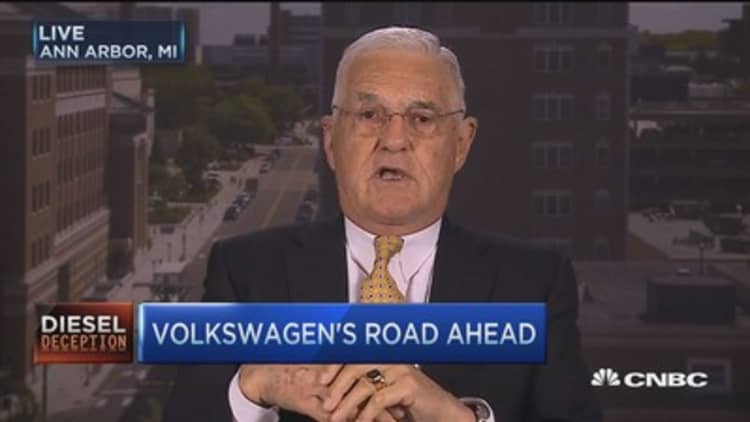
Former General Motors vice chairman Bob Lutz said Friday he would not know where to start if he were the next CEO of Volkswagen to address the fallout from the U.S. emission tests cheating scandal.
"This is about the worst situation any automobile company could be in because there really isn't any way to make those 11 million engines run on the legal cycle as well as they ran on the illegal cycle," he told CNBC's "Squawk Box."
Lutz, also a former president at Chrysler, said it's going to be "incredibly expensive" to bring the affected cars into compliance. Since the performance and the gas mileage will likely to be compromised in the process, the embattled German automaker could face consumer lawsuits, he added.
VW has set aside $7.3 billion in its third-quarter accounts to help cover costs relating to the scandal.
Read MoreJack Welch: 'Tar and feather' VW cheaters
The Environmental Protection Agency last Friday accused VW of installing a device in diesel vehicles to run maximum anti-pollution controls only when emissions tests were taking place. Fines could add up to $18 billion.
West Virginia University researchers using on-road testing, which EPA officials indicated would be added to the agency's emissions regimen as part of sweeping changes planned in light of the VW cheating.
Volkswagen is scheduled to announce its next chief executive Friday, as the German automaker looks to clean house. Martin Winterkorn resigned as Volkswagen CEO earlier this week, saying he accepts "responsibility for the irregularities," though he denied any personal wrongdoing.
A frontrunner for the top job is Matthias Mueller, president and CEO of VW's Porsche subsidiary.
In April, former chairman Ferdinand Piech resigned after losing a leadership battle with Winterkorn.
"Ferdinand Piech ... is a very, very hard dictatorial, my-way-or-the-highway type of person who constantly [was] firing people, threatening people 'you better succeed at this or you're out the door,'" Lutz said.
"When you've got that kind of culture where everybody fears for his or her job," he warned, "frankly, people will lie and cheat to do what the boss expects. And that is the danger in that type of culture."
Piech did not immediately respond to CNBC's request for comment.
During his time at GM, Lutz said he was constantly asking his engineers how Volkswagen could make diesel engines perform so well and pass environmental tests. "They said, 'We can't answer that question.'"
He said: "Honda asked the same question. They couldn't figure it out either because with near identical engines and hardware from the same suppliers, they could not get themselves to pass."
Lutz said the extra expenses associated with diesel engines basically don't pay off in better gas mileage. "You've got about a $2,000 to $3,000 cost penalty for the engine. And then you've got another $4,000 to 5,000 cost penalty for all the emissions equipment."
"Diesel is being legislated out of existence because the emission requirements for diesel are becoming so onerous," he argued. "Diesels almost no longer make any sense."


